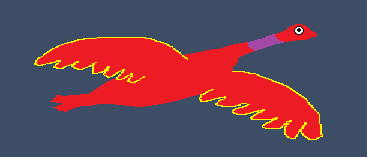Spadina Literary Review — edition 36 page 17
pensées

Ian Allaby, Canada goose
The Fall
by Iraj Fereshteh
I unwillingly lived with two different versions of “the Fall of Man” until I came to Kanada and adopted a Kanadian version by choice. I wrote “lived with” rather than “read” because we don’t actually read “The Fall”, do we? We breathe it in cultural practices, sociopolitical circumstances, and power relations. Why does every society need a narrative like “The Fall”? I have a rather clichéd explanation that still functions well for me for everyday purposes. Tales like “The Fall” are fabricated by a people’s elite — often for material gain — and forcefully pushed down the noses of the members of the society through religion, literature, art, and formal education. Exploitation is universal, so textual instances like “The Fall” have been developed everywhere.
What are the three Falls I have experienced? First, the Abrahamic version, which I always found stupid and, perhaps more importantly, disturbingly political. Second, the story of the Persian Adam, perhaps the most tasteless narrative of the formation of the first human community. Third, a native Kanadian Fall, which I fell in love with as soon as I was exposed to it. Here I propose that if we were not born into established cultures, which shape most of our preferences and perceptions of the world, and if we were given the choice between these Falls and ran our societies accordingly, we all would choose the third one: the native Kanadian Fall. Yes, all would do that. Listen!
Most probably, the only Fall or Creation story you, reader of this magazine, might know among these three would be the Abrahamic one — the Jewish, Christian, and Muslim construct. I don’t spend a lot of time on this version since you must have already heard major criticisms of the Abrahamic Fall, its view of women, for example, or how it insults our intelligence by suggesting we started life on earth as a result of the intrigues of a speaking snake.
What disturbs me is somehow deeper than these visibly sloppy irrationalities. I am more disgusted by the corruption, scheming, libel, deception, hostility, stupidity, and greed that the characters of the story display in the Abrahamic Fall. The serpent fools. Eve tempts, plots, and intrigues (she is much more innocent in the Qur’anic version though). Adam is so mind-bogglingly careless, irresponsible, and idiotic that he cannot even resist the temptation to eat from a banal apple tree. God is absent-minded, lazy, arbitrary, authoritarian, judgmental, and significantly less clever than the serpent. Really, who would punish people for having apples? God’s angels are a bunch of jealous rogues doing nothing in God’s harem but gossip and plot against any new creature that they imagine might be potentially a threat (humans, for instance). God is either so stupid that he has given them so much power, or he is so weak, vulnerable, and corrupt that he keeps these good-for-nothings around him so that any other creature would not rise against him.
What disgusts me most in this story is that everybody hates everybody. You don’t agree? Show me two characters who genuinely care about each other and wish to achieve something good together. I was very young when I first heard the story of the Abrahamic Fall. I might have been eight or nine and I must have read the story in our compulsory Islamic Theology class. Yes, Muslims believe in the same narrative. Even upon the very first encounter with the story, I felt suffocated when I tried to imagine if I could ever survive in the corrupt community the Fall portrayed. I felt I was too weak to live in the scary Garden of Eden. That same day, I told my teacher that the story was nonsense and I would not believe even one word of it. He kicked me out of the classroom.